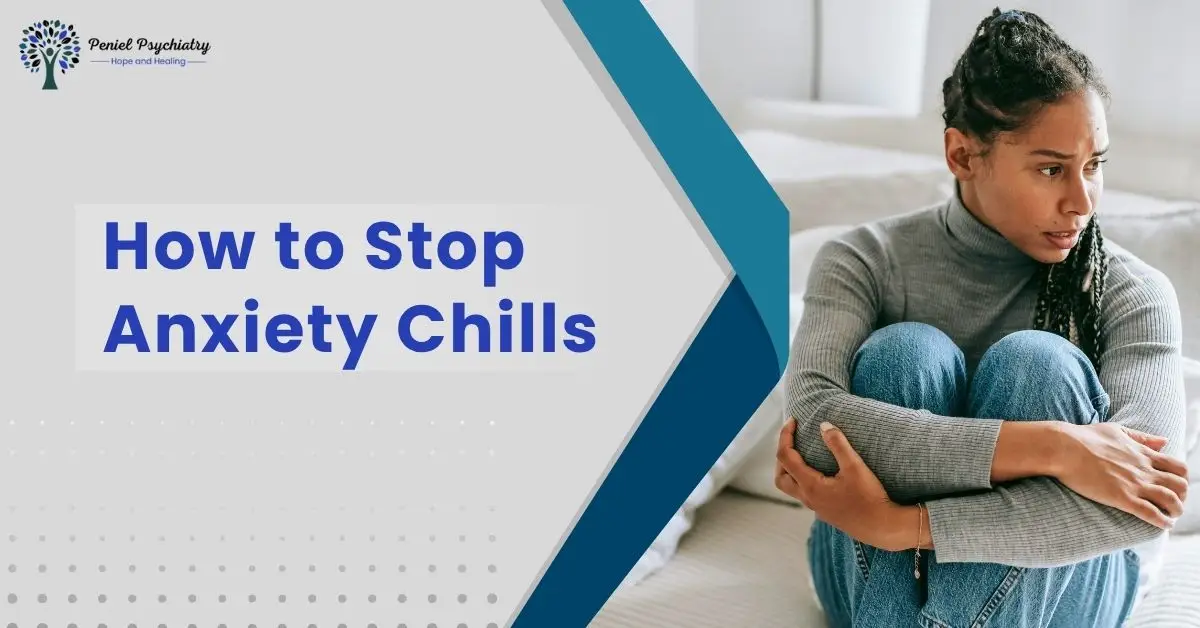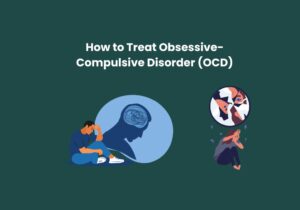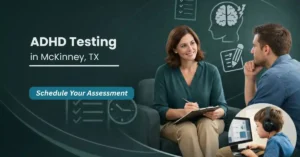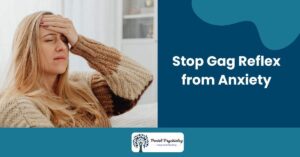If you’re looking for how to stop anxiety chills, you’re not the only one. Many people feel cold, shaky, or get goosebumps when they feel anxious. These signs can show up even if you’re not sick or have no fever. Your body is simply reacting to stress; this is a normal response.
In this blog, we’ll talk about why anxiety makes your body feel cold. We’ll also share easy ways to calm down fast. You’ll learn simple steps to stop chills now and how to keep them from coming back later.
What Do Anxiety Chills Feel Like?
Anxiety chills can feel strange, even a little scary. You may feel a wave of coldness pass through your body, get goosebumps, or start to shiver. This happens even when you’re not sick or the weather isn’t cold. It’s just your body reacting to anxiety.
How to Tell It’s Anxiety, Not Something Else
When anxiety hits, your body goes into “fight-or-flight” mode. It thinks you’re in danger, even if you’re not. This can cause physical symptoms such as chills, shaking, or feeling cold without an apparent reason.
These chills often come on fast. You may notice that your hands or feet become cold. Sometimes, you might feel goosebumps or light muscle tension. Your heart may race, too. These are all signs of an anxiety attack or stress response.
But how do you know it’s anxiety and not the flu? Here’s the difference:
- You won’t have a fever.
- You won’t feel weak or sick overall.
- The chills go away when you start to calm down.
If you’ve had these body chills from stress before, you’ll start to recognize the pattern. Knowing it’s anxiety can help you stay calm the next time it happens.
When your mind feels unsafe, your body follows. It’s not your fault; it’s just how your brain and body work together. You’re not broken, and you’re not alone. Many people feel this way. And the good news? You can learn to stop anxiety chills and take back control.
Why Does Anxiety Cause Chills?
Many people wonder why anxiety causes chills. It’s strange to feel cold or shaky when you’re not sick. But the body has a simple reason for this. Anxiety triggers a strong stress response that affects how you feel.
What Happens in Your Body During Anxiety
When you feel anxious, your nervous system goes into “fight-or-flight” mode. This means your body thinks you’re in danger. It prepares to either fight or flee. To do this, it releases a hormone called adrenaline.
Adrenaline changes your body in many ways. It makes your heart beat faster and sends more blood to your muscles. At the same time, it reduces blood flow to your skin to save energy. This drop in skin blood flow can make you feel cold or give you chills.
Also, anxiety can make your muscles tense up. When muscles contract, they can cause shivers or goose bumps. Your breathing might become shallow, which can also contribute to a feeling of coldness or shivering.
These changes are all part of the body’s natural way to protect you. Even though there’s no real danger, your body reacts like there is one. That’s why you feel chills during anxiety attacks or moments of high stress.
How Can You Stop Anxiety Chills Right Away?
Anxiety chills can come on suddenly and feel uncomfortable. The good news is you can calm your body fast. Simple steps can help reduce the cold, shivers, and muscle tension caused by anxiety.
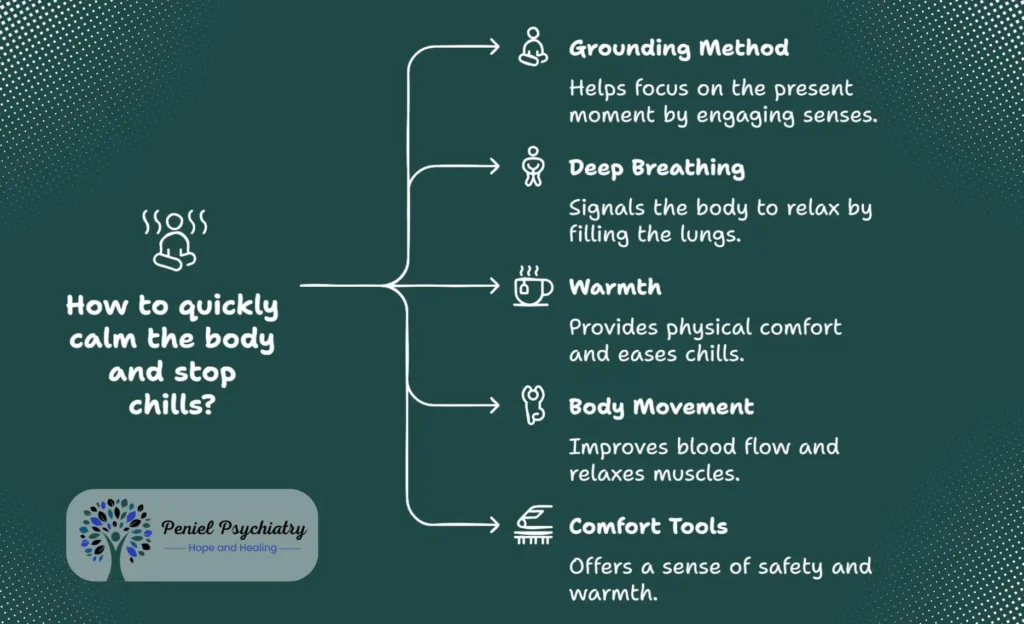
Quick Tips to Calm Your Body and Stop Chills
When anxiety chills hit, try these easy ways to feel better right away:
- Ground Yourself with the 5-4-3-2-1 Method: Notice five things you see, four things you can touch, three things you hear, two things you smell, and one thing you taste. It helps bring your focus away from the scary feelings and back to the present moment.
- Take Deep, Slow Breaths: Slow, deep breathing fills your lungs and signals your body to relax. Try breathing in for 4 seconds, holding for 4 seconds, and breathing out for 6 seconds.
- Use Warmth: Drinking warm tea or holding a heat pack can help warm your body and ease chills. Even wrapping yourself in a blanket helps.
- Move Your Body: Gentle stretching or walking helps blood flow and relaxes muscles. This can reduce shivers and muscle tension.
- Use Comfort Tools: A weighted blanket or cozy socks can make you feel safer and warmer.
These simple actions help calm your nervous system. They lower the fight-or-flight response, reducing adrenaline and stopping chills. When you practice these, you can take back control during anxiety attacks or stressful moments.
How Can You Prevent Anxiety Chills Long-Term?
Anxiety chills can happen again if you don’t manage your stress. The good news is you can reduce how often they come by making small changes in your daily life. These steps help your body stay calm and lower anxiety.
Simple Ways to Stop Anxiety Chills
Here are some easy habits you can start to prevent anxiety chills over time:
- Try Therapy: Cognitive Behavioral Therapy (CBT) helps you spot and change anxious thoughts. This reduces your body’s stress reactions, including chills.
- Get Enough Sleep: Sleep helps your body reset and recharge. When you sleep well, your stress response weakens.
- Eat Well, and Drink Water: Balanced meals and staying hydrated keep your body working smoothly. Avoid too much caffeine or alcohol, which can raise anxiety.
- Exercise Regularly: Engaging in physical activity helps lower stress hormones and improves blood flow. This helps reduce chills caused by tension.
- Practice Mindfulness or Meditation: Taking a few minutes each day to focus on your breathing or sensations helps calm your nervous system. This lowers the fight-or-flight response that causes chills.
By adopting these habits, you can help your body better manage stress. Over time, you’ll notice fewer anxiety chills and feel more in control of your body and mind.
When Should You Talk to a Mental Health Professional?
Anxiety chills can be scary, especially when they happen often or feel very strong. Sometimes, self-help steps are not enough to address the issue. Knowing when to get professional help is essential. A mental health expert can guide you to feel better and manage your symptoms safely.
Signs You Should See a Therapist or Doctor
Here are some clear signs it’s time to get help:
- Your chills occur frequently, disrupting your daily life.
- You often feel anxious, even without an apparent reason.
- Physical symptoms, such as chills, shaking, or a racing heart, scare you or make you feel out of control.
- You find it hard to calm down or focus on daily tasks.
- You want to learn better ways to manage anxiety and stress.
Mental health professionals, such as those at Peniel Psychiatry, are well-versed in understanding these symptoms and their underlying causes. They can help determine whether anxiety or another condition is causing your chills. They also offer treatments such as therapy, counseling, or medication as needed.
Remember, anxiety-related chills are not dangerous in themselves, but they can indicate that your anxiety needs attention.
Seeking help early can improve your quality of life and relieve symptoms more quickly. So book your appointment now to get help quickly.
FAQs About Stop Anxiety Chills
Can anxiety cause chills without a fever?
Yes, anxiety can cause chills even if you don’t have a fever. These chills happen because your body reacts to stress, not because of illness.
Are anxiety chills dangerous?
Anxiety chills feel uncomfortable but are not harmful. They show that your body is responding to stress. You can learn to manage them with calming techniques.
Can medication help with anxiety and chills?
In some cases, doctors may prescribe medication to reduce anxiety symptoms. Medication can help if anxiety chills happen often or cause substantial discomfort.
How long do anxiety chills last?
Anxiety chills usually last a short time. They often stop when your anxiety calms down or when you use relaxation methods.
What should I do if anxiety chills keep coming back?
If anxiety chills happen regularly, it’s a good idea to talk to a mental health professional. Therapy and lifestyle changes can help reduce symptoms.
Final Thoughts
Anxiety chills can feel strange and scary, but they are a regular part of how your body reacts to stress. You’re not alone in experiencing these symptoms, and they don’t mean you’re sick or broken.
Taking small steps, such as practicing deep breathing, grounding techniques, and adopting healthy lifestyle choices, can help you overcome chills and regain control. If anxiety chills happen often or disrupt your life, don’t hesitate to ask for help.
At Peniel Psychiatry, we understand how anxiety affects your body and mind. We’re here to support you with care and expert guidance. Remember, managing anxiety is a journey, and every step you take counts.
You can learn to calm your body and stop anxiety chills. It’s possible to feel better and regain peace of mind.

